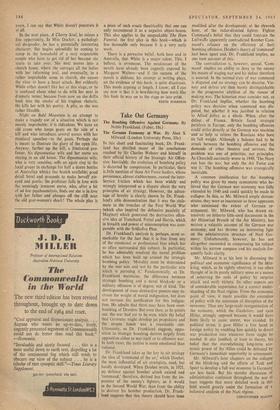Take Out Germany
IN this short and fascinating book, Dr. Frank- land has distilled many of the conclusions reached by Sir Charles Webster and himself in their official history of the Strategic Air Offen- sive. Inevitably, the evolution of bombing policy is distorted by compression. In particular, there is little mention of those Air Force leaders, whose persistence, almost stubbornness, caused the inter- Service friction which has been widely and wrongly interpreted as a dispute about the very principles of air strategy. However, the advan- tage of brevity is clearly shown by Dr. Frank- land's able demonstration that it was the stale- mate in the trenches of the First World War (which also inspired the defensive passivity of Maginot) which generated the destructive offen- sive idea of Trenchard, Portal and Harris, which in breadth and power of misconception was com- parable with the Schlieffen Plan.
Dr. Frankland's analysis is, perhaps, most re- markable for the fact that it is free from any of the emotional or professional bias which has so often surrounded this subject. In particular, he has admirably resolved the moral problem which has been built up around the strategic bombing policy. 'Morality must be determined by the war aim and not by the particular arm which is pursuing it.' Fundamentally, as Dr. Frankland maintains, the difference between strategic bombing and a naval blockade or a military offensive is of degree, not of kind. The development of mass destructive powers may in- crease the weight of moral indignation, but does not increase the justification for this indigna- tion. He admits that there may have been over- bombing of Dresden. But even then, as he points out, the war had yet to be won, while the belief that Germany might develop jet propulsion and the atomic bomb was a reasonable one. Ultimately, as Dr. Frankland suggests, oppo- sition to strategic bombing derives largely from opposition either to war itself or to offensive war. In both cases, the motive is more emotional than rational.
Dr. Frankland takes as the key to air strategy the idea of 'command of the air,' which Douhet, the most influential of air strategists, used, but hardly developed. When Douhet wrote, in 1921, no defence against bomber attack existed and 'command,' therefore, derived less from the im- potence of the enemy's fighters, as it would in the Second World War, than from the ability to destroy his bomber production, Dr. Frank- land suggests that this theory should have been
modified after the development, at the eleventh hour, of the radar-directed fighter. Fighter Command's belief that they could frustrate the Luftwaffe apparently contradicted Bomber Com- mand's reliance on the efficiency of their bombing offensive. Douhet's theory of 'command' had been upset and, Dr. Frankland implies, no one took account of this.
The contradiction is, however, unreal. 'Com- mand' implies an ability to deny to the enemy his means of waging war and his defeat therefore is assured. In the normal state of war command is disputed and no strategy can be decisive. Vic- tory and defeat are then barely distinguishable in the progressive attrition of the means' of making war. The historian must consider not, as Dr. Frankland implies, whether the bombing policy was decisive when command was dis- puted, but whether it was justified in relation to Allied policy as a %thole. When, after the defeat of France, Britain faced strategic paralysis in Europe, only the bombing offensive could strike directly at the German war machine and so help to relieve the Russians who bore its full weight. Although a balance had to be struck between the bombing offensive and the demands of other theatres and services, the problem was one of priorities, not principles. As Churchill succinctly wrote in 1940, The Navy can lose the war, but only the Air Force can win it.' The bombing offensive was strategically inevitable.
A common justification for the bombing policy was given by many economists who be- lieved that the German war economy was fully extended by 1940 and could quickly be made to collapse. In this, as Mr. Milward amply demon= strates, they were as inaccurate as those appeasers who minimised the extent of German re, armament. Mr. Milward, who has drawn ex- tensively on hitherto little-used documents in the Air Historical Branch of the Air Ministry, has written a valuable account of the German war economy, and has thrown an interesting light on the administrative structure of Nazi Ger- many. Unfortunately, however, he has not altogether succeeded in compressing his subject within his narrow compass and his analysis fre- quently lacks clarity.
Mr. Milward is at his best in discussing the political and economic significance of the blitz- krieg, which, as he rightly observes, is too often thought of in its purely military sense as a means of achieving the ends of policy by surprise attack and swift victory. Its other aspects are of considerable importance for a correct under- standing of the Nazi regime. From the economic point of view, it made possible the execution of policy with the minimum of disruption of the economy. Thus any large-scale reorganisation of the economy, which the Gauleiters, and even Hitler, strongly opposed because it would have been likely to cause unrest, was avoided. In political terms, it gave Hitler a free hand in foreign policy by enabling him quickly to divert war production into whatever form might be needed. It also justified, at least in theory, his belief that the overwhelming long-term eco- nomic power of the Allies could be defeated by Germany's immediate superiority in armaments.
Mr. Milward's later chapters on the collapse of the blitzkrieg and the efforts of Todt and Speer to develop a full war economy in Germany are less lucid. But his sketchy discussion of administrative confusion throughout the war at least suggests that more detailed work in this field would greatly assist the formation of a balanced analysis of the Nazi regime.
CHRISTOPHER MAK INS


































 Previous page
Previous page